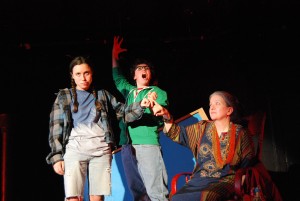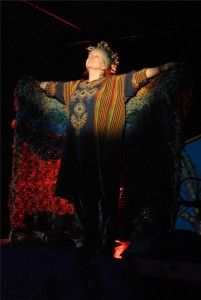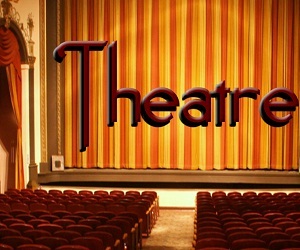
The Power of Birds (written by Robin Rice Lichtig and directed by Elizabeth Bunnell) begins with migration; but that of a family, not a flock. For a moment if you just sit still enough, you can see the allegory of it take shape in front of you: Father Philip Fogarty (Jay Potter) has left the family (apparently for good) and without even an emotional downshift Mom Loretta (Annie McGovern) moves into lead position – steering the flock toward new territory and new horizons that she feels will benefit all of them. Loretta Fogarty takes a job in a new state and brings her two children and her mother-in-law along. It’s as if nature has taken the place of nurture and the migration must happen according to some unspoken but unmistakable design. And despite grumblings from 12 year old daughter Zoe (Emma Galvin) who had a strong connection to her father, the family moves because they are compelled to by some inner compass. Loretta, a gym teacher with very little regard for the world of ornithology which was so important to her husband , uses sports metaphors and cheers to rally her family and take them into the next phase of the game (“Go Team Fogarty!”). Like a parrot, son Charlie (Noah Galvin) repeats everything his mother says, and even if he’s saying it for the first time you get a sense that it was filtered through his mother’s voice at some point first (In response to where their father might be, Charlie and his mother have this exchange: CHARLIE: Not working in an office like a man, right Mom? LORETTA: Not taking care of his 12-year-old children. CHARLIE: Not taking us on family trips, right Mom?) He is like the other half of his mother, like a twin.
He’s not his mother’s twin, however, he’s actually Zoe’s twin though the two children couldn’t be more different … and this is evident in the way each child aligns them self with a parent of their own. For while Charlie is carved from their mother’s stock, Zoe is her father’s daughter through and through, and it’s as if she’s still psychically connected to him, or wishing she could be. Without him front and center, leading their family, her ability to stay the course becomes wavering. She falters. She cowers. She’s not herself with her father gone.
It’s an interesting way to be a family … birdlike, even as Loretta resists the power to be like a bird. But even as she tears up her husbands good-bye note Zoe races to it, gathers it up, hoards it and attempts to build it back up into a note again, as if she’s using it to build a nest.

Freebird
So it’s no surprise that in a “if you build it he will come” type reasoning Zoe becomes obsessed with bringing her father back by using a tree house (to our eyes … but to a bird’s eye -especially a human-sized bird’s eye … this is clearly a nest) and uses her father’s own mother Lily (Margot Avery) as bait in order to lure him back. She reasons that he would be unable to find them in their new home, but migrational flight patterns would draw him back to their family (or at least to her). Her faith that a small house filled with his favorite things will bring her father back (as the bowerbird fills his bower with seeds, leaves and pebbles to entice the female bird) with enough of her father’s most precious things he won’t be able to resist. The same way birds can’t resist the GPS that’s encoded in their DNA to fly not just in a direction but to a certain place, Zoe reasons her father will be unable to wrest free of his encoded need to fly back to her.
Emma Galvin gives an energetic and emotional performance as the daughter left both shattered, as well as unmoored by her father’s departure; you can feel the desperate need in every bounding step she takes. She moves with a type of urgency that underlines the subtext of the play; the notion that time is wasting, that she needs to act quickly and precisely in a definitive and prescribed method in order for her father to make his way back to her.
Grandmother Lily provides an amazing transformation as she allows herself to be the crown jewel of this birdhouse. Her motives are to be closer to the sky in order to commune with the sunset which she feels embodies the spirit of her recently-deceased husband. As she allows the solitude of the tree house/nest to intertwine with her emotionally, she becomes more and more birdlike until ultimately, she flies. Margot Avery’s transformation is layered and filled with realism, odd though it is. Despite the characteristics she takes on, Ms. Avery never devolves into a caricature. She embodies the spirit of the birds rather than merely imitating them, and that creates a springboard from which her fellow actors may take off and join her on the journey, for there own transformation.
If you’re looking for a concrete story about a family, you won’t find it here; while many of the actions and ways of this family are familiar, the overall theme of this piece is allegory and magical realism. If you’re looking for a story about the healing power of faith … in yourself as well as in those who are closest to you … then The Power of Birds will leave you enchanted.
~~~
THE POWER OF BIRDS Milagro Theater at the CSV Education & Cultural Center 107 Suffolk (between Rivington & Delancey) Now through Saturday, March 13th, 2010 Thursdays through Saturdays at 8 p.m. Sundays at 3 p.m. Tickets are $18 and are now available online at www.brownpapertickets.com or by calling 1-800-838-3006. Tickets may also be purchased in-person half-hour prior to performance. Running Time: 90 minutes including one intermission Website: www.ThreeGracesTheater.org






{ 0 comments… add one now }